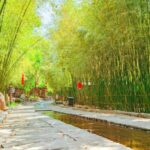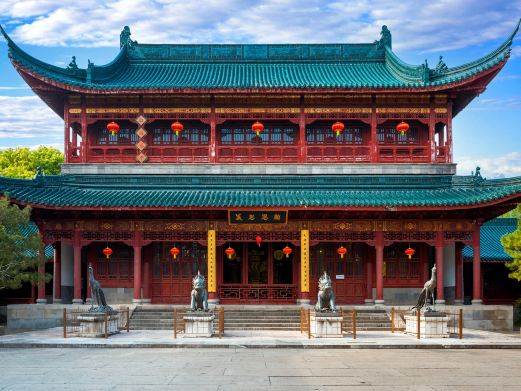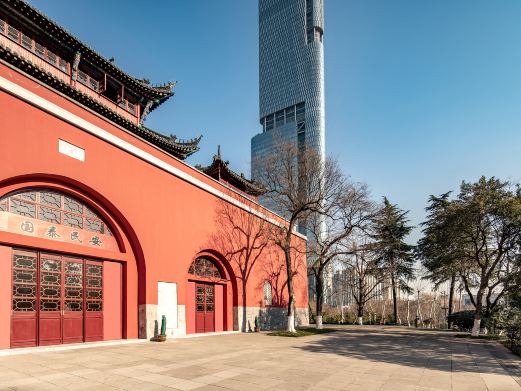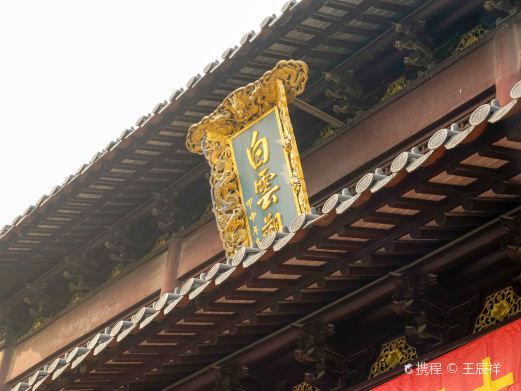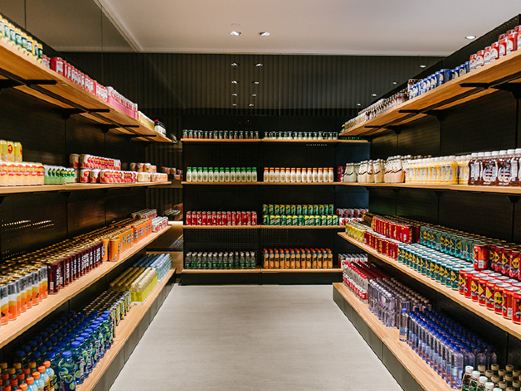The China Alligator Lake, also known as the Anhui Yangtze Alligator Breeding Research Center. The China Alligator Lake is a hilly area with undulating ridges. There are tall trees and shrub jungles in the territory. There are grass and thorns by the water’s edge. The vegetation coverage is good. Ditches, ponds, depressions, and reservoirs run through it and connect into a water network. It is an ideal ecological environment suitable for the habitat and reproduction of Yangtze alligators. The China Alligator Lake was established in 1979. It is a relatively large Yangtze alligator protection base in China. After 20 years of artificial breeding, the number of Yangtze alligators has increased from more than 140 wild ones collected at the beginning to more than 10,000. And it has the ability to breed 1,500 alligators annually. The Yangtze alligator has crossed the ‘endangered line’. This achievement has received affirmation and praise from the international community. The China Alligator Lake is not only a nature reserve and scientific research base but also a beautiful tourist attraction. Because the appearance of the Yangtze alligator is a bit like a dragon, and its common name also contains the word ‘dragon’, so it has been of noble value in Chinese history for a long time. Legend has it that more than 2,000 years ago, King Goujian of Yue sacrificed to alligators in order to restore his country and hoped to get its protection. Later, he really relied on three thousand armored soldiers to annex the State of Wu and take revenge. It can be seen that alligators have had a long influence in China. The Yangtze alligator is an amphibian and carnivorous. The main foods are fish, snails, clams, shrimps, chickens, ducks, geese, etc. Since 1987, the China Alligator Lake has gradually been opened to tourists. Opening hours: From April 1st to October 15th, it is open from 07:30 to 17:30; from October 16th to March 31st, it is open from 08:30 to 17:00. The opening hours of the propaganda and education hall: From Tuesday to Sunday every week, it is open from 9:00 to 17:00. Admission stops at 16:30. Preferential policies: Children: Those with a height of 1.2m (excluding) to 1.5m (including) can purchase half-price tickets. Those aged 6 years old (excluding) to 18 years old (including) can purchase half-price tickets with valid certificates., Half price; Children under 1.2m (including) in height or under 6 years old (including)., Free. Students: Full-time undergraduate and below students (excluding adult education, postgraduates and above) can purchase half-price tickets with valid student ID cards or relevant school certificates., Half price. Elderly: Elderly tickets for those aged 60 years old (including) to 65 years old (excluding) can purchase half-price tickets with valid ID cards., Half price; Elderly people aged 65 years old (including) or above can enter for free with valid certificates or ID cards., Free. Military personnel: Active-duty military personnel can enter for free with valid certificates. Members of medical teams aiding Hubei: All members of national medical teams aiding Hubei, including all members of national, military and medical teams of all provinces (autonomous regions and municipalities directly under the Central Government), can enjoy unlimited free admission for five years with valid certificates (ID cards, relevant certificates of medical teams aiding Hubei). The implementation time is until December 31, 2024.
Free Admission for Low-Income Households: Low-income households with valid identification receive free admission. Half-price for Active Military Families: Active military family members with preferential treatment certificates receive half-price admission. Free for Disabled Military Personnel: Disabled military personnel with military disability certificates receive free admission. Free for Retired Military Officers: Retired military officers with retirement certificates receive free admission. Free for People with Disabilities: Individuals with disability certificates receive free admission. Free for Retired Military Personnel: Retired military personnel with valid identification receive free admission. Free for Tour Guides: Tour guides with tour guide certificates receive free admission. Free for Journalists: Journalists with press cards receive free admission. Free for Photographers Association: Members of the Photographers Association with valid identification receive free admission. Supplementary Information: Half-price and free tickets are processed at the scenic area’s ticket window. The above information is for reference only; please check the information disclosed by the scenic area on the day of your visit for specifics. Service Facilities – Parking Lot: [Yangtze Alligator Lake Parking Lot], Reference Price: ¥5 per entry; Address: 3 kilometers south of Xuancheng District, Xuancheng City, Anhui Province, on Yangtze Road; Capacity: 500 spots.
Interesting Facts: The Yangtze alligator is a species unique to China and a first-class protected animal. It coexisted with dinosaurs and has miraculously survived several ‘mass extinctions’ to this day, living on Earth for 230 million years, earning it the title of ‘living fossil’. The name ‘Yangtze alligator’ is derived from its habitat – the Yangtze River (Yangtze River). The Yangtze alligator is an amphibious carnivore, with its main diet consisting of fish, snails, clams, shrimp, chickens, ducks, and geese. The Yangtze alligator has a hibernation period of nearly half a year, starting from November, and lives a long-term burrow life. Crocodile eggs have no gender distinction. The gender of the Yangtze alligator is determined by the incubation temperature. To maintain a balanced ratio of males and females, they build their nests, some on sunny slopes and others in damp, shaded areas of mountain hollows.


